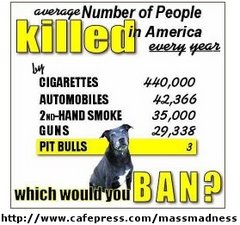Dog bites are down? Sure...
In the Toronto Sun was this tell it as it it article written by Linda Williamson.
How lazy legislation and stereotypes only breed more trouble
By Linda Williamson
Let's get away from stories of politics and prejudice and talk about an issue that has plenty of both, but with teeth. Of course I'm talking about dogs.
This past week's latest pit bull attack in Toronto coincided with a fascinating article by one of the city's most celebrated authors -- an article that exposes just how absurd Ontario's law banning pit bulls is.
Details about the attack are still sketchy, as charges are likely pending. Witnesses said a pit bull, apparently not muzzled or leashed as is now required by Ontario Attorney General Michael Bryant's new law, attacked a tiny Shih-Tzu and its owner, killing the animal. Tragic.
But Bryant quickly reminded the public that despite this ugly incident, his law was working. Pit bull attacks have declined since the law took effect last fall, he told the Sun.
Sounds great, but how would he know?
As a number of astute Sun readers (and dog enthusiasts) pointed out in letters to us last week, there is no way Bryant could back up that claim with numbers. That's because there is no province-wide body that keeps track of dog bites by breed. His assumption may be correct, since we're in the middle of winter, when all bites by all types of dogs naturally go down because people and dogs spend less time outside. But that's all it is -- a sweeping assumption.
But hey, why let the facts get in the way of a good quote -- or a bad law? That's not just my cynicism, it's the theory of none other than Malcolm Gladwell, the Toronto-born author of bestsellers The Tipping Point and Blink.
In a New Yorker article earlier this month, Gladwell dissects the bad logic behind Ontario's put bull ban -- likening it to other bad legal generalizations like racial profiling and assumptions about crime rates.
Just as stereotypes about race don't help police catch terror suspects ("they don't come dressed in identifiable costumes"), so are breed bans an illogical way to deal with the problem of aggressive dogs.
Not because judging a dog by its breed is akin to "racism" -- certain dog breeds do have certain reliably predictable traits. But aggression toward humans isn't one of them.
Study after study shows the most reliable connection between dogs and biting humans is the owner's background, Gladwell writes. Citing statistics on fatal dog attacks in the U.S., he shows how various breeds have predominated over the years (from Dobermans to pit bulls to Rottweilers to huskies), but the number of attacks has stayed constant. The most common factor between attacks isn't the breed of dog but the owners' own propensity to violence and trouble.
Court order ignored
He cites a case of a 2005 Ottawa attack, just prior to Bryant's ban coming into effect, that perfectly illustrates the point. Three pit-bull-type dogs that attacked a two-year-old boy turned out to have attacked children before -- but the owner, who had a troubled legal history himself, failed to obey a court order that he neuter, muzzle and train the dogs. Worse, no one followed up to enforce it.
As Gladwell notes, that kind of crackdown and enforcement is difficult. "It's always easier just to ban the breed."
Gladwell also offers a useful hint about why New York City's already-low crime rate is still declining: Police there keep a precise map of where all major crimes are happening, and new officers are assigned directly to troubled "hot spots" rather than being distributed around the city. As crime plunges, new hot spots are targeted.
Such a strategy challenges lazy assumptions about certain places being doomed to crime because of poverty or "cultural dysfunction," Gladwell writes -- the same kind of lazy assumptions at the heart of our well-meaning dog ban.
Toronto and law enforcers like Bryant could learn a lot from Gladwell's examples (he's also a champion of the "broken window" crimefighting theory that worked so well in New York, but Toronto seems to prefer tolerating vagrants and gunfire on our streets).
But I won't hold my breath. After all, Bryant is the guy who still thinks he can stop crime by "banning" handguns.






























No comments:
Post a Comment